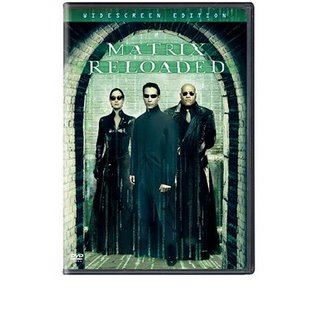 When we last left our heroes, Neo had ascended to become the One, Trinity had found love, Agent Smith was in several pieces and Morpheus was probably feeling a bit smug. THE MATRIX made more money than anyone expected, and so a trilogy was formed, the two sequels being shot back-to-back and released in 2003, THE MATRIX RELOADED in the summer, THE MATRIX REVOLUTIONS in the fall. And since this is the second part of the essay series, you can guess which film I'm writing about.
When we last left our heroes, Neo had ascended to become the One, Trinity had found love, Agent Smith was in several pieces and Morpheus was probably feeling a bit smug. THE MATRIX made more money than anyone expected, and so a trilogy was formed, the two sequels being shot back-to-back and released in 2003, THE MATRIX RELOADED in the summer, THE MATRIX REVOLUTIONS in the fall. And since this is the second part of the essay series, you can guess which film I'm writing about.Morpheus' ship returns to the free human city of Zion, hundreds of feet beneath the Earth's surface. The resistance has just learned that the machines are planning a direct assault on the city by digging straight down and sending a quarter-million Sentinels (the squiddy things) to destroy it. Neo, who's been having dreams where Trinity dies, talks with the Oracle, who sends Neo on a quest to find the "Source", the Matrix's mainframe computer. Meanwhile, Agent Smith is back, and being blown up from within by Neo has given him the ability to turn people- and other Agents- into copies of himself. He's also gone rogue, working for his own gain and steadily building up an army of duplicates.
He's not the only rogue program in the mix. Turns out the Oracle is one too, and in their quest Neo, Morpheus and Trinity run across a gang of seemingly supernatural creatures led by the Merovingian (Lambert Wilson) and his wife(?) Persephone (Monica Belucci), who isn't actually that important to the movie except for the fact that she is Monica Belucci. It's an interesting new layer added to the conflict, and it's the nature of a trilogy to alter the nature of what's happening as it goes along.
People didn't think this one was as good as the first, and I sort of agree even though I still enjoyed it. It seems bloated and overextended in places, even though it's about the same as the first movie in terms of objective length. This is mostly due to the construction of certain scenes as elongated, elaborate setpieces, giving the production a vaguely lopsided feel. It's also not quite as gritty or intense as the original, at least for the first half- the Matrix isn't as ugly and hopeless a place to be trapped in, and there's not the same feeling of desperation on the part of the characters. The film also suffers from being virtually humorless, and I think Fishburne's performance is hurt by his character continually having to speechify- which he did in the first film, but not in such an abstract manner.
And there's the plot and philosophy, and the fact that the two have become pretty tightly intertwined. Morpheus believes in the prophecy, in Neo ending the war solely through the power of being the One, but others in Zion are much more concerned with the practical matter of defending the city and its people from the very tangible and real death machines burrowing down to kill them all. Last installment (linked here in case you found this page on its own), I talked a bit about how it was kinda interesting that, on the one hand, Neo and company are rebelling against control by the machines and Neo specifically says he doesn't like the idea of fate for that reason, but on the other hand, he is guided and influenced by the prophecies of the Oracle. The same conflict between freedom and fate occurs here, and is complicated when Neo discovers that he's part of a program, but a program that contains an element of choice (or so it seems.) One of the barriers to understanding the story is that so much of it is presented in abstract and philosophical terms- the concrete reality is tough to nail down. Heroic sagas generally have similar philosophical conflicts, but disguise them more adeptly, meaning the audience only has to follow the literal action. I think I got it this time around, but of course I can't display all my findings until seeing the next movie.
In the end, though, I like this. There are some great action sequences, like a battle between Neo and Smith's endless duplicates which quickly becomes an exercise in classic Hong Kong fight theatrics (complete with hordes of Smiths pouring from every open doorway), and a long but inventive freeway chase. In the end it does what the second act of an epic should do: get the characters in deeper trouble and tell us that everything we thought we knew was wrong. It opens up the world and starts the countdown to the climax. It could have done so a bit more smoothly and clearly, but at the end, I wanted to get to the next one. To paraphrase one of the characters from the movie, it did what it was supposed to do.
Grade: B
No comments:
Post a Comment